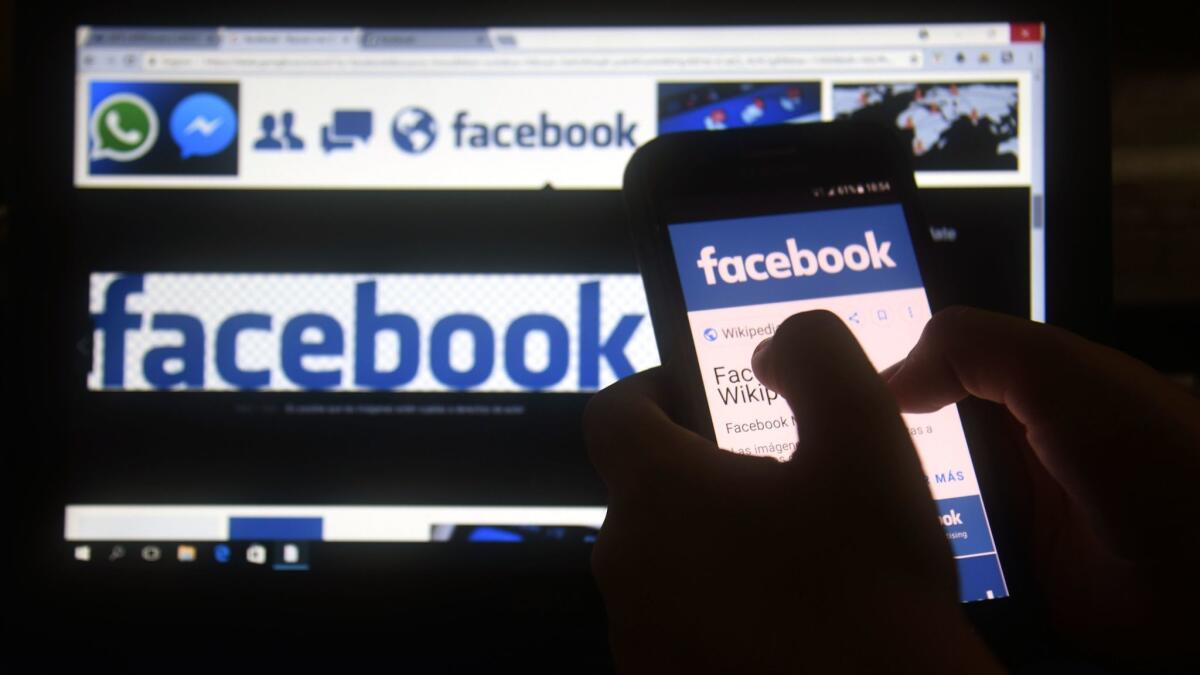Facebook posts strong profit and lukewarm revenue

Facebook Inc. didnât hit it out of the ballpark with its latest quarterly report, but the hopes arenât so high these days for the image-battered social networking giant.
The Menlo Park, Calif., company reported a slight revenue miss but stronger-than-expected profit for the July-through-September period. Coming three months after its stock suffered its biggest one-day drop in history, which wiped out $119 billion of its market value, the mixed results were perhaps not the redemption Facebook hoped for.
But shares rose in after-hours trading after Facebook announced its results â suggesting, at least, that the social media giant didnât further spook investors. With the myriad problems Facebook is facing, thatâs what passes for good news these days.
âOverall, given all the challenges Facebook has faced this year, this is a decent earnings report,â EMarketer analyst Debra Aho Williamson said.
Facebook said it had 2.27 billion monthly active users at the end of the quarter, below the 2.29 billion that analysts expected. The company said it changed the way it calculates users, which reduced the total slightly. Its user base was still up 10% from 2.07 billion monthly active users a year earlier.
The companyâs audience continued to stall in the United States and in Europe. It had 185 million daily users in the United States and Canada, the same as it did the two previous quarters. It lost 1 million daily users in Europe, after losing 3 million in the previous quarter because of new privacy regulations that went into effect in the region.
The social network continued to see broad gains in the rest of the world, upping the number of people who log in daily to 1.49 billion. The company does not break down user growth numbers for its other services, including WhatsApp, Instagram and Messenger.
Facebook posted profit of $5.14 billion, or $1.76 a share, up 9% from $4.71 billion, or $1.59 a share, in the year-earlier quarter. Revenue for the quarter was $13.73 billion, an increase of 33%.
Analysts had expected earnings of $1.46 a share on revenue of $13.77 billion, according to FactSet.
Last quarter, the company warned that its revenue growth will slow significantly for at least the rest of this year and that its expenses will continue to balloon. The next day the stock plunged 19%. It was the biggest one-day plunge in Facebook history, and the shares have since fallen further amid a broader decline in tech stocks.
Facebookâs investors, users, employees and executives have been grappling not just with questions over how much money the company makes and how many people use it, but also with the social networkâs effects on usersâ mental health and worries over what itâs doing to political discourse and elections around the world.
The problems have been relentless for the last two years. Facebook can hardly crawl its way out of one before another comes up. It began with âfake newsâ and its effects on the 2016 presidential election (a notion Chief Executive Mark Zuckerberg initially dismissed) and continued with conservatives alleging bias.
Then thereâs hate speech, hacks and a massive privacy scandal in which Facebook exposed the data of as many as 87 million users to data-mining firm Cambridge Analytica, along with resulting moves toward government regulation of social media. And there have been sophisticated attempts from Russia and Iran to interfere with elections and stir up political discord in the United States.
Business challenges are also piling up.
There are stricter privacy regulations in Europe that can impede how much data Facebook collects on users. Facebook and other tech companies face a new âdigital taxâ in Britain. The company is spending heavily to boost security, moderating content and investing in new technologies such as artificial intelligence.
On Tuesday, Arjuna Capital and the New York State Common Retirement Fund filed a shareholder proposal asking Facebook to publish a report on its policies for governing what is posted on its platform and explain what it is doing to âaddress content that threatens democracy, human rights, and freedom of expression.â
âYoung users are deleting the app, and all users are taking breaks from Facebook,â said Natasha Lamb, managing partner at Arjuna Capital. âWhen you start to see users turn away from the platform, thatâs when investors get concerned.â
A recent Pew Research Center survey found that more than a quarter of U.S. Facebook users have deleted the app from their phones and 42% have taken a break for at least a few weeks. Younger users were much more likely to delete the app than their older counterparts.
Nonetheless, Facebook is still enjoying healthy user growth outside the United States.
Facebookâs shares climbed 4% to $152 in after-hours trading after rising $4.13, or 2.9%, to $146.22 in regular trading Tuesday.
The Washington Post was used in compiling this report.






